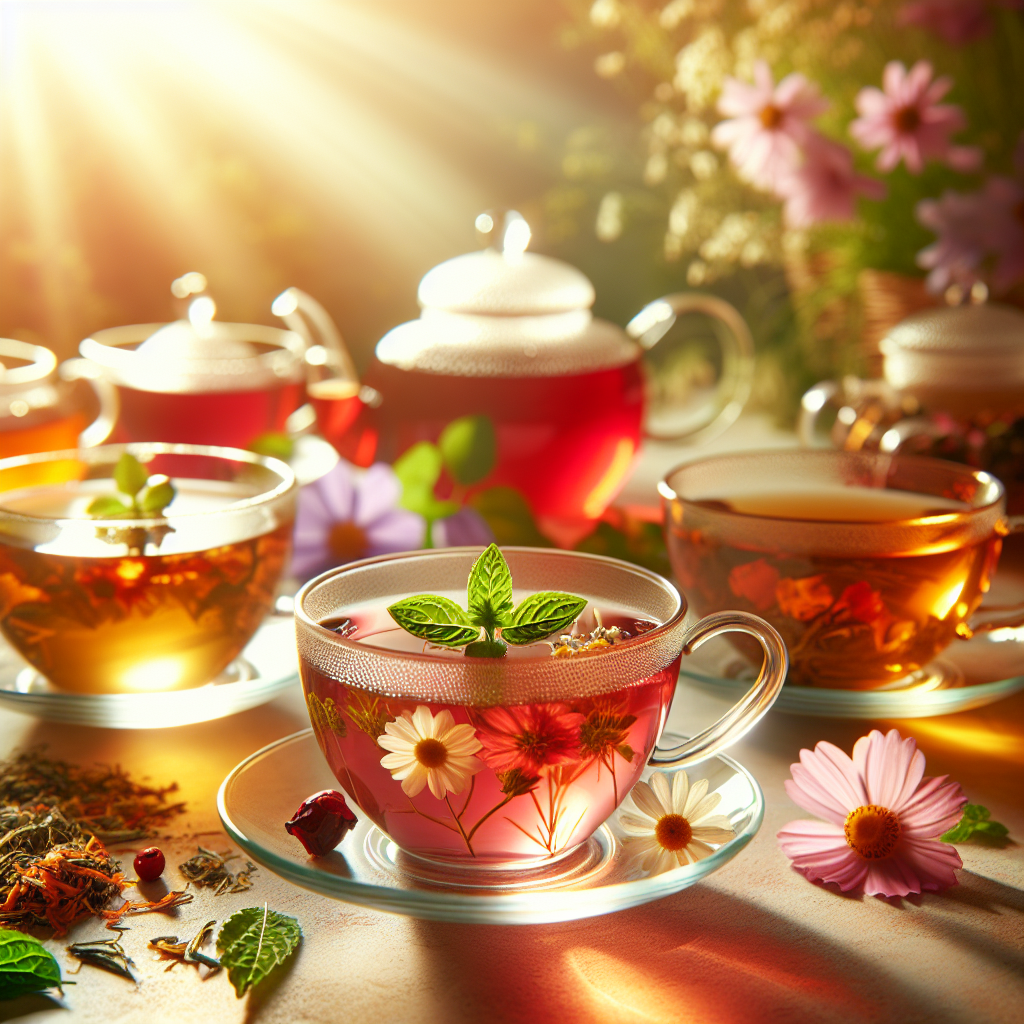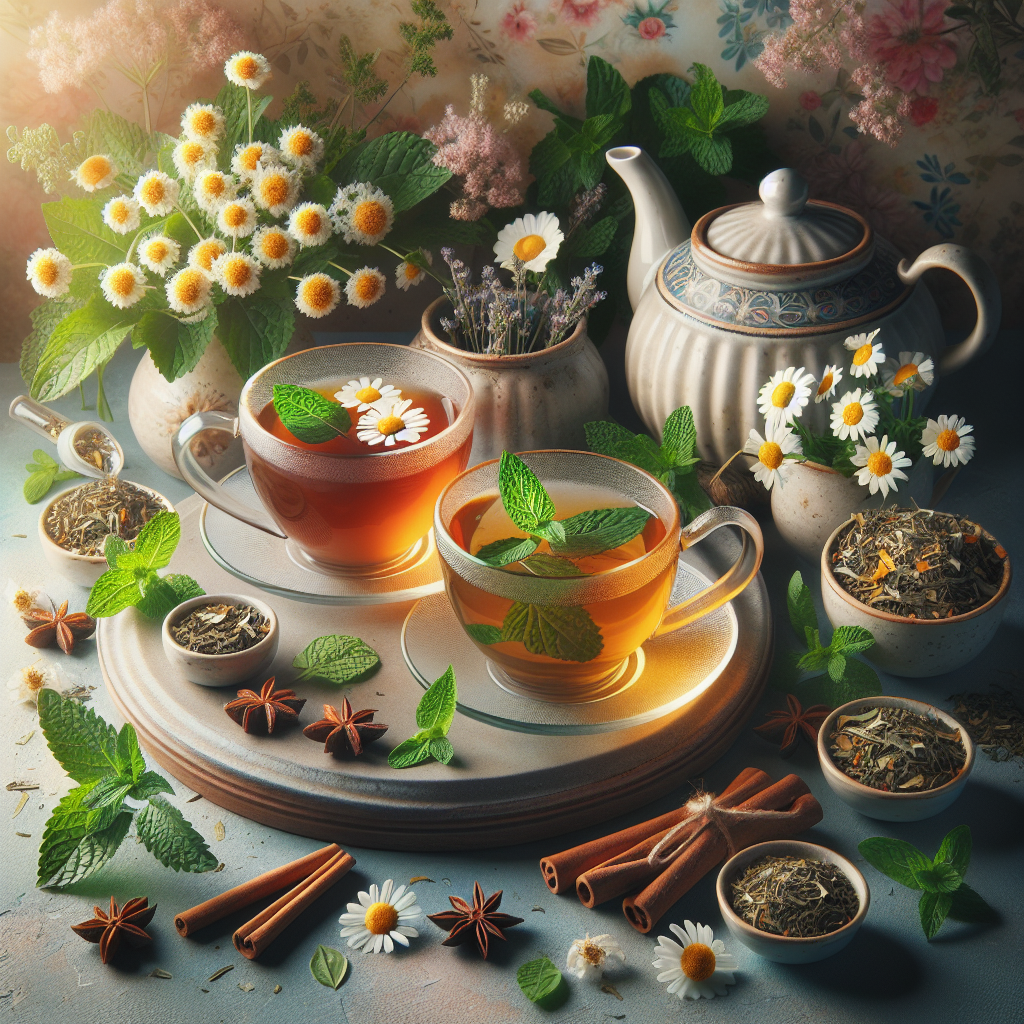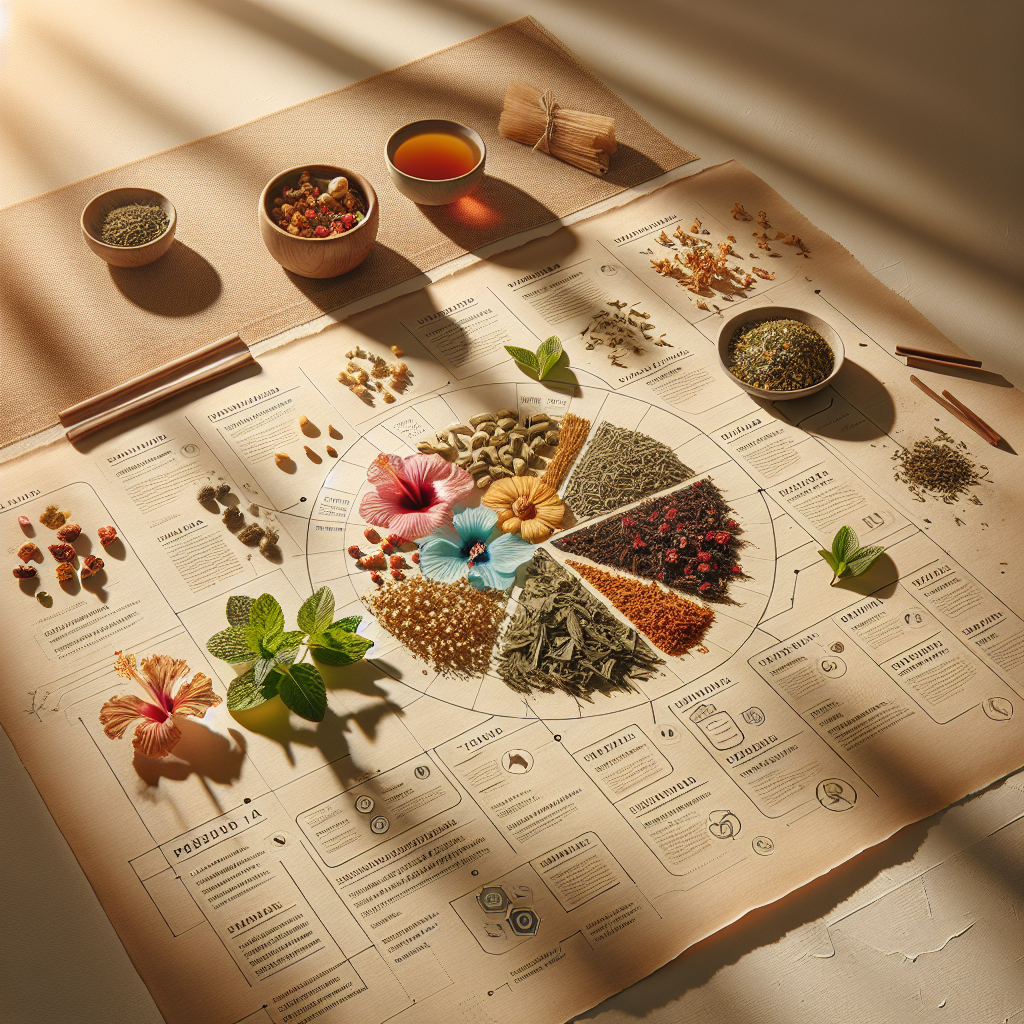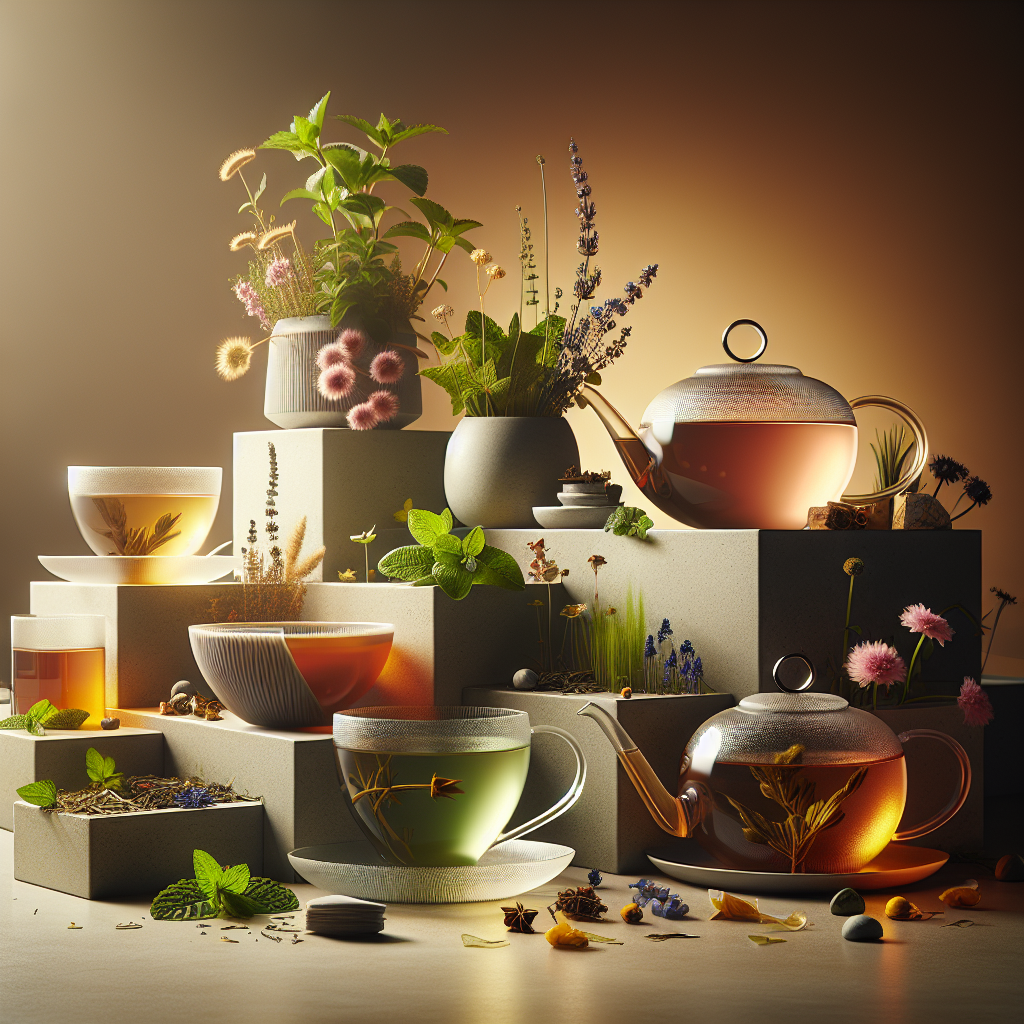In a world increasingly dominated by synthetic remedies and fast-paced lifestyles, many individuals find themselves grappling with stress, fatigue, and various health issues. The quest for natural solutions has led to a resurgence in the popularity of herbal teas, which offer a range of benefits that are often overlooked. As a wellness enthusiast and advocate for holistic health, I aim to illuminate the myriad advantages these soothing brews provide. This article will explore how herbal teas can enhance overall well-being, from promoting relaxation and aiding digestion to boosting immunity and providing essential nutrients. By delving into the science behind these natural infusions, as well as sharing practical tips for incorporating them into daily life, readers will gain a comprehensive understanding of why herbal teas deserve a prominent place in their health regimens.
Understanding Herbal Teas
Definition and Types of Herbal Teas
Herbal teas, also known as tisanes, are beverages made from the infusion of herbs, spices, flowers, or fruits in hot water. Unlike traditional teas derived from the Camellia sinensis plant, herbal teas do not contain caffeine and are often celebrated for their diverse flavors and potential health benefits. The variety of herbal teas available is vast, encompassing well-known types such as chamomile, peppermint, hibiscus, and rooibos, as well as lesser-known blends that include ingredients like lemongrass, ginger, or lavender.
Each type of herbal tea brings its own unique properties. For example, chamomile is renowned for its calming effects, making it a popular choice for relaxation, while peppermint is often used to aid digestion. Hibiscus tea, with its vibrant color and tart flavor, is rich in antioxidants and may help lower blood pressure. This diversity allows individuals to select herbal teas based on their taste preferences and health goals.
Historical Significance and Cultural Uses
The history of herbal teas dates back thousands of years, with origins rooted in ancient civilizations. In traditional Chinese medicine, herbal teas have been utilized for their therapeutic properties, while Ayurvedic practices in India have long emphasized the use of herbs in daily wellness rituals. Each culture has its own unique methods of preparation and consumption, often incorporating local flora.
For instance, in the Middle East, mint tea is a staple, often served as a gesture of hospitality. Similarly, in South America, yerba mate, made from the leaves of the Ilex paraguariensis plant, serves both social and health purposes. These cultural practices underscore the importance of herbal teas not only as beverages but also as integral components of social and medicinal traditions across the globe.
How Herbal Teas Differ from Traditional Teas
One of the most significant distinctions between herbal teas and traditional teas lies in their botanical origins. Traditional teas, such as black, green, oolong, and white, are all derived from the leaves of the Camellia sinensis plant and contain varying levels of caffeine. In contrast, herbal teas are typically caffeine-free and can be made from a wide range of plants, including flowers, fruits, seeds, and roots.
Furthermore, the preparation methods for herbal teas often differ as well. While traditional teas are usually brewed at specific temperatures and steeped for precise durations to extract optimal flavor and benefits, herbal teas can vary widely in their brewing techniques. Some herbs may require longer steeping times to release their flavors and beneficial compounds. Additionally, herbal teas can be enjoyed hot or cold, making them versatile options for any time of year.

In essence, the differences between herbal and traditional teas highlight the rich diversity of infusion options available to consumers, providing numerous avenues for exploration and enjoyment in the world of beverages.
Health Benefits of Natural Infusions
Promoting Relaxation and Reducing Stress
Natural infusions, particularly those made from herbs such as chamomile, lavender, and valerian root, are renowned for their calming properties. Chamomile tea, for instance, contains apigenin, an antioxidant that binds to specific receptors in the brain, promoting relaxation and reducing anxiety levels. A study published in the Journal of Clinical Psychopharmacology found that regular consumption of chamomile could significantly lower symptoms of generalized anxiety disorder.
Furthermore, herbal infusions can serve as a ritualistic practice that encourages mindfulness, allowing individuals to take a moment away from their hectic schedules. The simple act of brewing a cup of tea can create a sense of calm, contributing to overall mental well-being. Incorporating a daily cup of herbal tea into your routine can be an effective strategy for managing stress and promoting a sense of tranquility.
Supporting Digestive Health
Herbal teas are not only soothing but also beneficial for digestive health. Infusions made from peppermint and ginger have been widely recognized for their ability to alleviate digestive discomfort. Peppermint tea, rich in menthol, can help relax the muscles of the gastrointestinal tract, making it an excellent choice for individuals suffering from bloating and gas. Research published in the Journal of Gastroenterology indicates that peppermint oil can significantly reduce symptoms of irritable bowel syndrome (IBS).
Additionally, ginger tea has been shown to aid in digestion by stimulating saliva and bile production, which are essential for breaking down food. A study in the Journal of Ethnopharmacology suggests that ginger can help reduce nausea and improve overall digestive function. For those looking to enhance their digestive health, incorporating these herbal infusions into their diet can provide significant relief and support.
Enhancing Immune Function
The immune-boosting properties of herbal teas are well-documented, with various infusions offering significant health benefits. Elderberry and echinacea are two notable herbs known for their immune-enhancing effects. Elderberry, in particular, is rich in antioxidants and vitamins A, B, and C, which can help bolster the immune system. A study published in the Journal of International Medical Research found that elderberry extract reduced the duration and severity of influenza symptoms.

Echinacea is another powerful herb that has been shown to increase the production of white blood cells, which play a crucial role in fighting infections. Regular consumption of echinacea tea during cold and flu season is believed to reduce the likelihood of catching a virus. By incorporating a variety of herbal teas into your daily routine, you can effectively support your immune system and enhance your body’s natural defenses against illness.
Essential Nutrients Found in Herbal Teas
Vitamins and Minerals
Herbal teas are not just delightful beverages; they are also packed with essential vitamins and minerals that contribute to overall health. For instance, chamomile tea is rich in vitamin C, known for its immune-boosting properties, while nettle tea offers a substantial amount of vitamin K, crucial for bone health and proper blood clotting. Additionally, herbal teas like hibiscus are high in potassium, which plays a vital role in maintaining healthy blood pressure levels and supporting cardiovascular function. Incorporating a variety of herbal teas into your daily routine can help you meet your nutritional needs while enjoying a flavorful and soothing drink.
Antioxidants and Their Role in Health
Antioxidants are compounds that help combat oxidative stress in the body, which can lead to chronic diseases and aging. Herbal teas are an excellent source of these beneficial compounds. For example, green tea is celebrated for its high content of catechins, a type of antioxidant that can enhance metabolic rate and improve fat oxidation. Similarly, rooibos tea contains aspalathin and nothofagin, which have been shown to possess anti-inflammatory properties and may contribute to heart health. Regular consumption of antioxidant-rich herbal teas can support the body’s defense against free radicals and promote overall well-being, making them a smart choice for health-conscious individuals.
Herbal Teas as a Source of Hydration
Staying adequately hydrated is essential for maintaining optimal bodily functions, and herbal teas can be a delicious and effective way to achieve this. Unlike caffeinated beverages, most herbal teas are naturally caffeine-free, making them suitable for hydration throughout the day. Drinking a variety of herbal teas, such as peppermint or lemon balm, can not only quench thirst but also offer additional health benefits, including digestive support and stress relief. Moreover, the warm liquid can promote relaxation, aiding in hydration while providing a comforting ritual. For those looking to enhance their fluid intake, enjoying several cups of herbal tea daily can be a beneficial and enjoyable practice.
Incorporating Herbal Teas into Daily Life
Choosing Quality Herbal Teas
When selecting herbal teas, the quality of the ingredients significantly impacts both flavor and health benefits. Look for teas that are labeled as organic, as this ensures that they are free from pesticides and harmful chemicals. Additionally, consider sourcing teas from reputable brands that provide detailed information about their sourcing practices and ingredient quality. Whole leaf teas tend to offer more robust flavors and higher concentrations of beneficial compounds compared to tea bags that often contain dust or fannings.
Reading reviews and seeking recommendations from trusted sources can also guide you to high-quality options. Consider exploring local tea shops where you can smell and taste different blends before making a purchase. Freshness is key; therefore, opt for teas with a harvest date and consume them within a year for optimal flavor and potency.
Brewing Techniques for Maximum Benefits
The way you brew your herbal tea can greatly influence its efficacy and taste. Begin by using filtered water to avoid any contaminants that may alter the flavor. The temperature of the water is crucial; most herbal teas brew best with water heated to about 200°F (93°C). Steeping times vary by type, with most herbal teas requiring between 5 to 10 minutes to fully extract their flavors and healthful properties. For instance, chamomile should steep for about 5 minutes, while hibiscus may need closer to 10 minutes.
Experimenting with different brewing methods can also enhance your experience. For a more concentrated infusion, try the cold brew method by steeping the herbs in cold water for several hours in the refrigerator. This results in a smooth, refreshing beverage that is perfect for hot days. Additionally, consider using a French press or a tea infuser to allow the herbs to expand fully and release their flavors more effectively.
Creative Ways to Enjoy Herbal Teas
Incorporating herbal teas into your daily routine can be both enjoyable and versatile. One simple method is to incorporate herbal tea into your cooking. Use brewed herbal teas as a base for soups, risottos, or marinades to infuse them with unique flavors while reaping the health benefits. For instance, using green tea in a marinade for chicken can enhance flavor while providing antioxidants.
Another creative approach is to use herbal teas in smoothies or cocktails. Brew a strong infusion of your favorite herbal tea, chill it, and blend it with fruits and vegetables for a nutritious smoothie. Alternatively, mix herbal tea with your choice of spirits and mixers for a refreshing cocktail that boasts health benefits. For example, a lavender-infused gin and tonic not only tastes delightful but also offers calming properties.
Lastly, consider hosting a tea tasting event with friends or family. This social experience allows everyone to explore various herbal blends and discover new favorites. Pair the teas with complementary snacks, such as light sandwiches or pastries, to create a delightful atmosphere. Such gatherings not only enhance your appreciation for herbal teas but also foster connections with others.
Popular Herbal Teas and Their Unique Benefits
Chamomile: The Calming Brew
Chamomile tea, derived from the dried flowers of the chamomile plant, is renowned for its soothing properties. Traditionally used to promote relaxation and sleep, chamomile contains apigenin, an antioxidant that binds to certain receptors in the brain, promoting drowsiness and reducing insomnia. A study published in JAMA Internal Medicine found that participants who consumed chamomile tea experienced improved sleep quality compared to those who did not.
In addition to its calming effects, chamomile tea also possesses anti-inflammatory and antioxidant qualities, which can aid in alleviating symptoms of anxiety and stress. Incorporating chamomile into your evening routine can not only help you unwind but also enhance your overall well-being by supporting a restful night’s sleep.
Peppermint: A Digestive Aid
Peppermint tea is widely celebrated for its ability to support digestive health. The menthol in peppermint acts as a natural antispasmodic, which means it can help relax the muscles of the gastrointestinal tract, alleviating discomfort from bloating, gas, and indigestion. Research published in the Journal of Gastroenterology suggests that peppermint oil, when consumed, can significantly reduce symptoms of irritable bowel syndrome (IBS).
Moreover, sipping peppermint tea can provide immediate relief from nausea and headaches. Its refreshing flavor not only invigorates the palate but also promotes a sense of clarity and focus. For those who often experience digestive issues, drinking peppermint tea after meals can be an effective, natural remedy to aid digestion and enhance overall gut health.
Echinacea: Immunity Booster
Echinacea tea, made from the Echinacea plant, is a popular herbal remedy known for its immune-boosting properties. Rich in antioxidants, this tea helps stimulate the immune system, making it particularly effective in combating colds and flu. According to a study published in the American Journal of Preventive Medicine, regular consumption of echinacea can reduce the duration and severity of respiratory infections.
In addition to its immune-enhancing benefits, echinacea also has anti-inflammatory properties that can soothe symptoms of infections and reduce inflammation in the body. Drinking echinacea tea, especially during the cold months, can be a proactive approach to maintaining your health and preventing illness. For optimal benefits, consider starting echinacea tea at the onset of cold symptoms to help your body fight off infections more effectively.
Safety and Considerations
Potential Side Effects and Interactions
While herbal teas are often perceived as safe and natural alternatives to traditional beverages, it is crucial to recognize that they can have side effects and may interact with medications. Some common herbal ingredients, such as chamomile, can cause allergic reactions, particularly in those with allergies to plants in the daisy family. Additionally, herbs like valerian and kava may induce drowsiness, which can be problematic if you are planning to drive or operate heavy machinery.
Certain herbal teas can also interact with prescription and over-the-counter medications. For example, St. John’s Wort is known to reduce the effectiveness of various drugs, including antidepressants and birth control pills. Moreover, licorice root can elevate blood pressure, which could pose risks for individuals with hypertension or heart conditions. It’s essential for tea drinkers to research specific herbs and consult reliable sources to understand their potential side effects and interactions fully.
Guidelines for Pregnant or Nursing Women
Pregnant and nursing women should approach herbal tea consumption with caution. Although some herbal teas provide beneficial properties, others may pose risks to both the mother and the baby. For instance, teas containing herbal ingredients like raspberry leaf are often recommended in the later stages of pregnancy for their potential to prepare the uterus for labor. However, herbs such as pennyroyal and blue cohosh should be avoided due to their potential to induce miscarriage or other complications.
It is advisable for pregnant or nursing women to limit their intake of herbal teas to those that are well-studied and deemed safe. Consulting with a healthcare provider before introducing any new herbal products is essential to ensure that both mother and child remain healthy. Additionally, moderation is key; consuming small amounts of herbal tea occasionally may be safer than frequent or large quantities.
Consulting Healthcare Professionals
Before beginning any new herbal regimen, consulting with healthcare professionals is highly recommended. Medical practitioners, such as doctors or registered dietitians, can provide personalized advice based on individual health conditions and medication regimens. This is particularly important for individuals with chronic health issues, those on multiple medications, or anyone who has a history of adverse reactions to herbal products.

Healthcare professionals can also offer guidance on the appropriate types and amounts of herbal teas that may benefit your specific health needs. By discussing your interest in herbal teas with a professional, you can ensure that you are making informed choices that prioritize your health and well-being. Additionally, they can help monitor any potential side effects or interactions that may arise from herbal tea consumption, allowing for timely adjustments to your approach as needed.
conclusion
In conclusion, herbal teas, or tisanes, offer a delightful and healthful addition to our daily routines. Their diverse range of ingredients not only enhances flavor but also provides numerous health benefits, from promoting relaxation and reducing stress to supporting digestive health. With essential vitamins and minerals, these natural infusions can play a vital role in bolstering the immune system and overall wellness. However, it is essential to choose high-quality herbal teas and remain mindful of potential side effects and interactions with medications. By incorporating popular varieties like chamomile and peppermint into our diets, we can enjoy not only the soothing properties of these beverages but also their unique health benefits. Ultimately, embracing herbal teas can lead to a more balanced and health-conscious lifestyle, allowing us to savor the rich traditions and advantages that these natural infusions provide.






